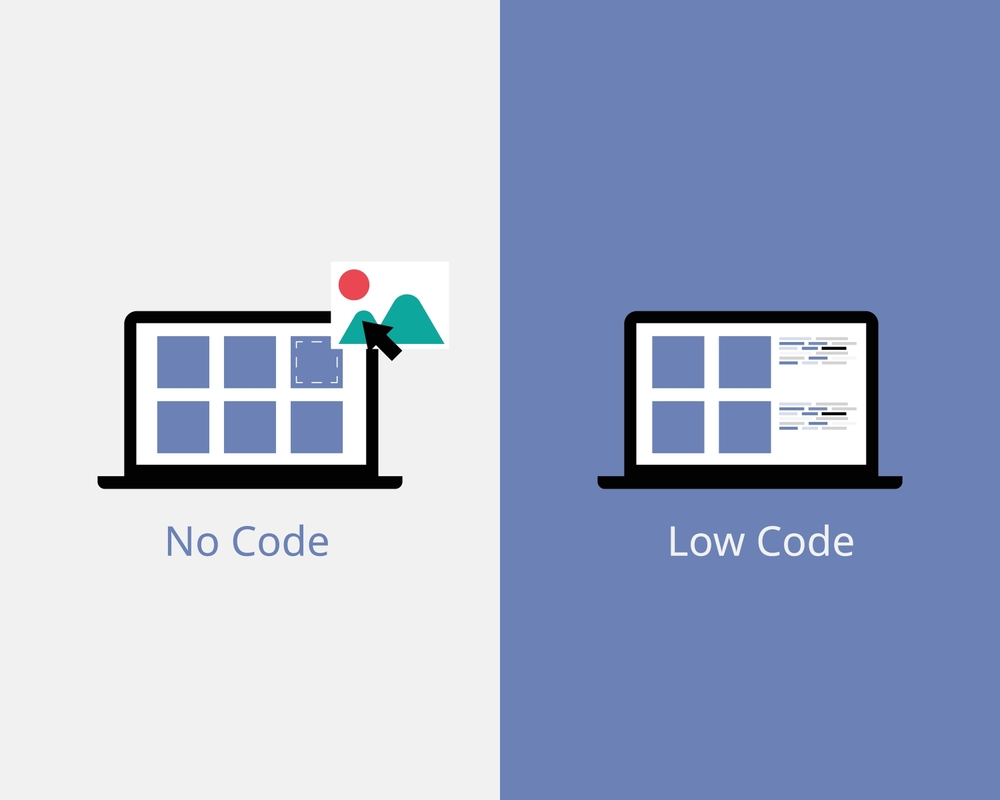Highlights:
- Low-Code/No-Code development platforms work by providing users with visual interfaces and drag-and-drop functionalities to design, build, and deploy applications without the need for extensive coding.
- LCNC platforms offer an ideal way to create prototypes and minimum viable products swiftly.
Traditional software development often requires highly skilled developers to write complex lines of code, resulting in time-consuming and costly processes. However, the landscape has transformed dramatically with the advent of low-code no-code development platforms.
These innovative platforms empower technical and non-technical individuals to create applications and automate processes efficiently, significantly reducing development time and increasing productivity. We’ll explore the intricate details of LCNC platforms and how they are revolutionizing the app development process.
To begin with, let us uncover the significance of development platforms in non-integrated format to understand their compatibility in mitigating the risks of modern app development.
Low-Code Development Platforms
Low code is a development approach that uses visual interfaces and pre-built components to expedite application development, reducing the need for extensive manual coding.
In low-code development, users with varying technical backgrounds can efficiently create and deploy applications, accelerating the modern software development lifecycle.
Low-code platforms empower businesses to innovate rapidly and bridge the gap between IT and business users by enabling easier collaboration and faster time-to-market for applications.
No-Code Development Platforms
No-code refers to a software development approach allowing users to create applications and automate processes without writing code. It empowers non-technical individuals to actively involve in app development, accelerating the process and fostering innovation.
With individual functionality being assessed, we’ll move on to exploring the integrated compatibility of development platforms, forming a base for working and development.
Low-Code No-Code Development Platforms
LCNC development platforms are software tools that allow users to create applications with minimal coding (low code) or entirely without writing any code (no code). These platforms typically utilize visual interfaces and drag-and-drop functionalities, enabling users to design, integrate, and deploy applications swiftly. This democratization of software development has opened opportunities for businesses, entrepreneurs, and individuals who lack extensive coding expertise but have brilliant application ideas.
The conceptual understanding now takes the course of content to comprehend the overall functioning that serves app development with minimal or negligible coding inputs.
Working of Low-Code/No-Code Development Platforms
Low-code and no-code development platforms work by enabling users to facilitate application development without the need for extensive coding. In the case of low-code platforms, users may still require some coding, but it is minimal compared to traditional development.
No-code apps, on the other hand, allow users to create applications entirely without writing any code. These platforms often come with pre-built templates, components, and connectors to simplify the development process further.
By enabling technical and non-technical users to collaborate in app development, low-code/no-code platforms streamline the process and effectively empower organizations to address their unique needs and challenges.
Despite the integrated working offering functional benefits, it is crucial to go for comparative analysis to understand what segment serves better and how to implement the one necessary for the specific requirement.
Low-Code Vs. No-Code
A low-code development platform enables developers to design applications to relieve the high cost of hand-coding, using visual interfaces and pre-built components, accelerating development and reducing complexity. Contrary to this, the no-code development platform takes simplification a step further, allowing non-technical users to create applications without coding, relying on intuitive drag-and-drop tools and templates for quick and easy development.
With the direct distinctive analysis being explored, let us unfold the numerous benefits of the integrated development system.
Advantages of Low-Code/No-Code Development Platforms
-
Accelerated Development
With LCNC platforms, developers can build applications faster than traditional coding methods. Drag-and-drop options, pre-built templates, and reusable components channel the process, leading to rapid development cycles.
-
Cost-Effectiveness
As the need for hiring specialized developers diminishes, businesses can significantly reduce development costs. Moreover, the faster process time translates to an increased return on investment.
-
Empowering Non-Technical Users
Low-code, no-code app development platforms bring application development closer to business users and domain experts who can better understand their needs. These individuals can actively participate in the development process, reducing the dependency on IT departments.
These remarkable utilities can be better experienced with multiple practical applications.
Use Cases of Low-Code/No-Code Development Platforms
-
Business Process Automation
LCNC platforms are excellent tools for automating repetitive tasks and workflows within organizations. From HR processes to inventory management, these platforms enable businesses to streamline operations and improve efficiency.
- Customer-Facing Applications
Entrepreneurs and businesses can leverage low-code, no-code platforms for mobile app development to build data-intensive applications and customer-facing solutions like websites, device apps, and self-service portals. These applications can enhance customer experiences and drive customer engagement.
-
Prototyping and MVP Development
For startups and small businesses, the best low-code, no-code app development platforms offer an ideal way to create prototypes and minimum viable products (MVPs) swiftly. This allows them to validate their ideas in the market with minimal investment.
-
System Integration
LCNC platforms often come with pre-built connectors to popular third-party services and APIs, facilitating seamless integration between different systems and databases.
The functioning, structure, benefits, and noteworthy use cases indeed assure subsequent app development trends.
Future of Low-Code/No-Code Development Platforms
As technology continues to evolve, so will low-code/no-code development platform trends. We can expect even more sophisticated tools with advanced AI capabilities, natural language processing, and enhanced integration options. With ongoing improvements, these platforms will continue to empower a broader audience to participate actively in the software development process, further bridging the gap between idea and execution.
The Final Word
Low-code and no-code development platforms have proven to be a game-changer in software development. By simplifying the process and making it accessible to a broader audience, these platforms have unlocked a world of possibilities for businesses and individuals alike.
Whether you are an entrepreneur looking to build a startup, an enterprise aiming to enhance operations, or an individual with a creative vision, LCNC platforms are the key to turning ideas into operations without requiring extensive coding expertise. As technology advances, the future of LCNC platforms looks bright, promising even greater democratization and innovation in software development.
Explore more IT infra-related whitepapers for the latest insights.








































































